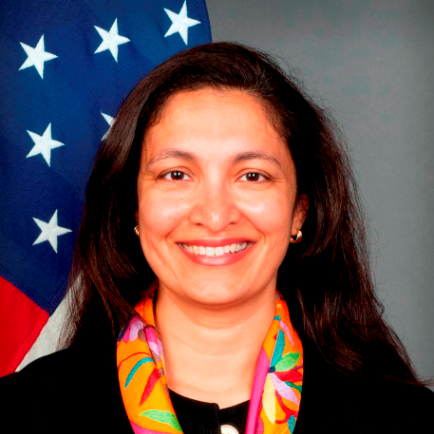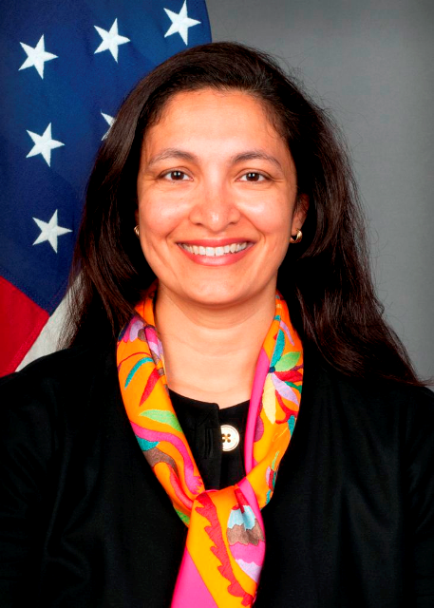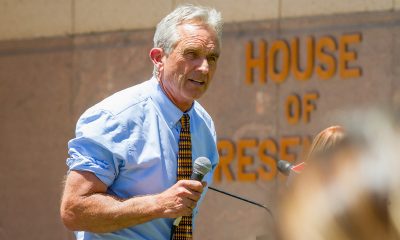World
State Department criticizes Russia over gay rights
Uzra Zeya spoke to Blade after John Kerry attended GLIFAA Pride event

A senior State Department official on Wednesday said the U.S. government has grown increasingly concerned about anti-LGBT discrimination and violence in Russia.
Uzra Zeya, acting assistant secretary of the Bureau of Democracy, Human Rights and Labor, spoke to the Washington Blade in an interview at her Foggy Bottom office hours after the Russian Duma unanimously approved a bill that would ban foreign same-sex couples and single people from nations that allow same-sex marriage from adopting Russian children. The U.S. LGBT group All Out earlier on Wednesday said authorities fined Coming Out St. Petersburg, a Russian LGBT advocacy group, 500,000 rubles ($15,000) under a “foreign agent” law the Kremlin is using to sue gay rights organizations.
The Russian Duma on June 11 passed a separate measure that would ban the “promotion of homosexuality” to minors.
The State Department in January criticized Russian lawmakers who supported the bill on its first reading.
“We are absolutely against any legislation that prohibits same-sex consensual relations and we speak out against it and so it’s a consistent position,” Zeya said. “We’re very concerned by the overall direction in Russia. It is something that we have communicated directly to the Russian government.”
Two men allegedly sodomized Vladislav Tornovoi with empty beer bottles and set his body on fire near Volgograd on May 10 after he reportedly came out to them as gay. Authorities on the Kamchatka Peninsula in Russia’s Far East said three men stabbed and trampled a gay man to death a few weeks later before they set his car on fire with his body inside.
Authorities on May 24 arrested Nikokai Alekseev, co-founder of Moscow Pride, and 29 other LGBT activists who tried to hold a Pride celebration outside Moscow City Hall. Police also arrested dozens of advocates who tried to stage a kiss-in outside the Duma before lawmakers approved the “promotion of homosexuality” to minors measure.
Zeya declined to say whether President Obama raised the issue with Russian President Vladimir Putin during their meeting on Monday at the annual G-8 summit that took place in Northern Ireland.
Zeya: State Department seeks to reach “directly at grassroots”
Then-Secretary of State Hillary Clinton in 2011 proclaimed “gay rights are human rights” during a landmark speech she gave in Geneva to commemorate International Human Rights Day. Obama on the same day issued a presidential memorandum that directed government agencies that implement American foreign policy to promote LGBT rights in the countries in which they work.
In addition to talking about Russia, Zeya noted to the Blade the Global Equality Fund — a public-private partnership that includes Finland, Iceland and the John Evans Foundation founded by C-SPAN co-founder John Evans — has spent more than $4 million in 25 countries since its 2011 inception to directly support activists and underrepresented groups. The USAID-backed LGBT Global Development Partnership with the Gay and Lesbian Victory Institute, the Swedish International Development Corporation Agency and other groups will contribute $11 million over the next four years to advocacy groups in Honduras and other developing countries.
30 Colombian LGBT rights activists attended the partnership’s first training that took place in Bogotá, Colombia, from May 29-June 2.
“It’s about reaching directly at the grassroots in the countries concerned,” Zeya said. “We still have a situation where nearly 80 countries have laws prohibiting or basically making homosexuality illegal. This is an uphill battle that we have to continue to fight and we’re looking to bring more partners in on this so you can’t say this is exclusively an American agenda or a U.S. government agenda, but in fact this is a common effort to support universal rights and equality.”
Zeya also spoke to the Blade immediately after Secretary of State John Kerry spoke at Gays and Lesbians In Foreign Affairs Agencies (GLIFAA)’s annual Pride event at which Georgia Congressman John Lewis and National Center for Transgender Equality Executive Director Mara Keisling spoke. Obama earlier in the day specifically mentioned gays and lesbians during a speech he delivered at the Brandenburg Gate in Berlin.
“It shows the president’s commitment to LGBT equality, but also that we view LGBT rights as just part of universal rights as the secretary (Kerry) said,” Zeya said. “We heard that in a very compelling and heartfelt way from Sec. Kerry that this has been a life-long commitment and he’s committed to this struggle. He recognizes how far we’ve come and in some ways how shocking some of the past sort of debate on this issue, but he’s totally committed to going forward so I think we have a real synergy between both the president and the secretary in determination to move ahead.”
South America
Argentina government dismisses transgender public sector employees
Country’s Trans Labor Quota Law enacted in 2021

Protests have broken out across Argentina in recent weeks after the dismissal of transgender people from their government jobs.
President Javier Milei’s action is in stark contract with the progress seen in 2023, where the government’s hiring of trans people increased by 900 percent within the framework of the Trans Labor Quota Law that had been in place since 2021.
Among those affected is Sofia Diaz, a “survivor” who shared her testimony with the Washington Blade hours after she traveled from Chaco Province to Buenos Aires to protest her dismissal.
Presentes, an LGBTQ news agency, reported the government dismissed more than 85 trans employees in less than two weeks.
Diaz, 49, holds a degree in combined arts. She joined the National Social Security Administration (ANSES) in 2022 under the Trans Labor Inclusion Law. The layoffs began in January and left many people feeling uncertain and anguished. It was her turn a few days ago.
Diaz in an interview recounted how the situation became progressively more complicated, with difficulties in accessing information about her employment status and the eventual confirmation of dismissals through WhatsApp messages. This government action, according to Diaz, violates the law.
“We were on a Friday, I think on March 24, in the office and we have a WhatsApp group of other colleagues from all over Argentina who entered through the trans labor quota and they tell us if we can get our pay stubs on the intranet,” Diaz recalled. “So, I tried to enter, I could not, I talked to two other colleagues and they told me no, they could not, and so we went to another person. He couldn’t either.”
“Some people told us that it could be a system error. Well, we were never calm, let’s say not how this issue of installing fear and the perversion with which they do it ends,” she added. “This sadism of … inflicting pain and speculating with your misfortune and so on … is something that characterizes Javier Milei’s government.”
Diaz recalled a list of those dismissed from the agency began to circulate from the union in the afternoon. A colleague passed it on to her, “and well, unfortunately I was also on that list.”
“At that moment the whole weekend went by with anguish, crying, and talking with other colleagues from other places, not only trans, but everyone, everyone and everyone,” she said. “On Monday when we went to try to enter, we could not enter with the biometric, which is the thumb we had to use every morning to enter.”
Despite the difficult moment through which she is going, the trans activist stressed to the Blade that she will continue protesting and will even sue the government because her dismissal is illegal and “violates the constitution itself.”
The LGBTQ community and its allies have mobilized and organized demonstrations, highlighting the importance of defending the rights won and fighting against discrimination and exclusion. Diaz emphasized the fight is not only for the people affected today, but also for future generations, saying the historical memory of the struggles for inclusion and social justice must be kept alive.
“The Argentine government thus faces a key challenge in human and labor rights, where public pressure and social mobilization can play a determining role in protecting the rights of LGBTQ+ people,” Diaz said.
Africa
For queer Nigerians, being on gay dating apps is still a risk
Homophobes target users for violence

Gay hookup apps like Grindr, and dating apps like Tinder and Bumble have managed to proliferate queer communities in countries like Nigeria.
Those who seek one night stands find what they want while those looking for love equally find what they seek. These platforms have managed to position themselves as safe spaces for queer people in anti-gay Nigeria. In recent times, however, it is proving to be unsafe, as homophobic people are quickly learning about the apps, and opening accounts that either seek to outrightly threaten queer people, or pretend to be queer, have long chats with gay people, invite them over, and inflict violence on them.
Take the case of Biodun, a queer Nigerian man who joined Grindr to meet up with guys like him.
After Biodun had built a connection and agreed to meet with someone whose display name was “Mamba,” they decided to meet up only for him to be met with violence. Apparently, Mamba ran a catfish account.
“I’ll never forget that day,” Biodun, who asked the Washington Blade not to use his last name because of safety concerns, said. “I still think about it, and sometimes blame myself for being very careless, even though Grindr was supposed to be our safe space.”
Biodun’s experience isn’t peculiar to him.
In Nigeria, draconian laws that criminalize same-sex relationships exist, making queer people turn to the digital realm to explore their identities and seek connections beyond the confines of societal oppression that comes with the physical environment. Gay dating apps such as Grindr, therefore, have emerged as virtual sanctuaries, offering spaces for queer Nigerians to forge friendships, find solidarity, and pursue romantic or sexual relationships. Spaces like this, however, have morphed into a landscape fraught with danger, as homophobic people have weaponized these platforms to perpetuate hate and violence.
“Sometimes, I often wonder how they learned about these platforms,” Daniel, which is not his real name, told the Blade. “You would think that it is just us in the platforms, until you find out that the accounts are rooted in homophobia.”
One time, someone’s bio read, “I’m only here to deal with the gay people. I know all of you, and I will find and kill you. We no want una for here (translates to we do not want you here, in English.)” It was a stark reminder that these spaces are no longer LGBTQ-friendly for Nigerians. In 2014, there was the passage of the Same-Sex Marriage Prohibition Act by former President Goodluck Jonathan, which not only criminalized same-sex unions, but also imposed severe penalties on anyone involved in LGBTQ advocacy or support.
This law catalyzed a surge in discrimination and violence against queer Nigerians; emboldening regular civilians, religious extremists, and even law enforcement agencies to target individuals perceived as deviating from traditional gender and sexual norms. Again, amid this hostile environment, gay dating apps emerged as lifelines for many queer Nigerians, offering avenues for discreet communication, community building, and the pursuit of intimate relationships.
The very anonymity and freedom these apps provided, however, became double-edged swords.
The advent of screenshot and screen-recording capabilities on these apps, for example, reduced the risks of exposure, strengthening the safety and privacy of users. However, this also comes with its own lapses, as queer people using Grindr have often relied on screenshots and screen recordings to confirm the identities of potentials with their friends, before accepting to meet.
“Before the removal of the screenshot option, I usually shared photos of others with my trusted friends,” Biodun shared. “But since that was taken off, there was no way for me to do that.”
Although, according to Grindr’s terms and conditions, the removal came with privacy concerns, as it was to facilitate a safe dating experience.
This erosion of digital safe spaces is depriving queer Nigerians of vital avenues for self-expression and affirmation,and is exacerbating the psychological toll of living in a society that continues to systematically demonize their identities. Moreover, the normalization of homophobic rhetoric and violence in both physical and digital realms has perpetuated a cycle of fear and oppression, and is reinforcing this notion that LGBTQ individuals are inherently unworthy of dignity and respect. Despite these challenges, though, the resilience of queer Nigerians continue to persist, as they defy societal norms and assert their right to love and be loved.

Dominica’s High Court of Justice on Monday struck down provisions of a law that criminalized consensual same-sex sexual relations.
A gay man who remains anonymous in 2019 challenged sections of the country’s Sexual Offenses Act that criminalized anal sex and “gross indecency” with up to 10 years and 12 years in prison respectively. The plaintiff argued the provisions violated his constitutional rights.
The Dominica Equality and Sexual Expression Association and the Eastern Caribbean Alliance for Diversity and Equality, a group that advocates for LGBTQ and intersex rights in the region, in a press release noted the court in its ruling affirmed “the criminalization of consensual same-sex activity between adults is unconstitutional.” The groups added Justice Kimberly Cenac-Phulgence “declared that the laws commonly known as buggery and gross indecency laws, contravenes the constitution of the Commonwealth of Dominica, namely the right to liberty, freedom of expression, and protection of personal privacy.”
“It is long past time that the dignity and dreams of all Dominicans were recognized,” said DESEA Executive Director Sylvester Jno Baptiste in the press release. “We are all God’s children, and he loves us all equally. Laws that treat some Dominicans as less than others, have no place in a just society.”
Dominica is a former British colony that is located between Guadeloupe and Martinique in the Lesser Antilles.
Antigua and Barbuda, St. Kitts and Nevis, Barbados, and Trinidad and Tobago in recent years have decriminalized consensual same-sex sexual relations.
The Inter-American Commission on Human Rights in 2021 issued a decision that said Jamaica must repeal its colonial-era sodomy law. The country’s Supreme Court last year ruled against a gay man who challenged it.
A judge on St. Vincent and the Grenadines’s top court in February dismissed two cases that challenged the country’s sodomy laws.
“Decriminalization helps create an environment where LGBTQ individuals can live openly without fear of persecution, enabling them to access health care, education, and employment without facing discrimination,” said Outright Executive Director Maria Sjödin on Monday in response to the Dominica ruling. “The repeal of these discriminatory laws is a testament to the tireless efforts of activists, advocates, and allies who have long fought for justice and equality. It is a victory for human rights and a significant milestone in the ongoing struggle for LGBTQ rights in the Caribbean.”
-

 State Department2 days ago
State Department2 days agoState Department releases annual human rights report
-

 Maryland4 days ago
Maryland4 days agoJoe Vogel campaign holds ‘Big Gay Canvass Kickoff’
-

 Politics3 days ago
Politics3 days agoSmithsonian staff concerned about future of LGBTQ programming amid GOP scrutiny
-

 The White House1 day ago
The White House1 day agoWhite House debuts action plan targeting pollutants in drinking water











